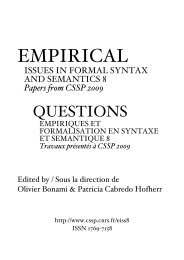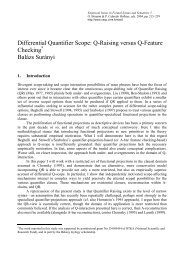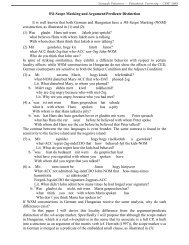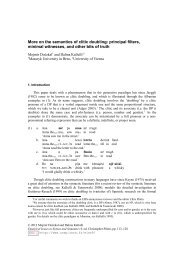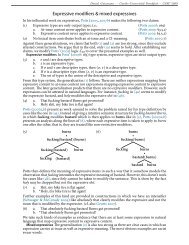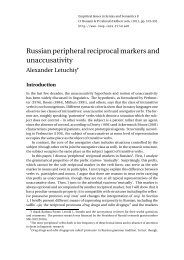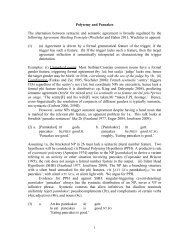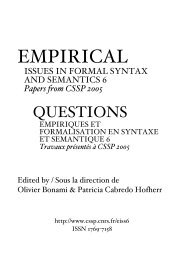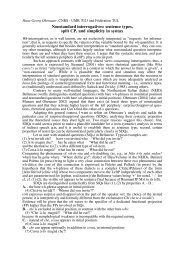Empirical Issues in Syntax and Semantics 9 (EISS 9 ... - CSSP - CNRS
Empirical Issues in Syntax and Semantics 9 (EISS 9 ... - CSSP - CNRS
Empirical Issues in Syntax and Semantics 9 (EISS 9 ... - CSSP - CNRS
Create successful ePaper yourself
Turn your PDF publications into a flip-book with our unique Google optimized e-Paper software.
However, it must be stressed that these are preferences rather than clear-cut choices. Count<strong>in</strong>g<br />
apart the cases of morphological syncretism, out of 110 <strong>in</strong>stances of il est probable <strong>in</strong> Frantext<br />
s<strong>in</strong>ce 1950, six are with the subjunctive <strong>and</strong> 89 with the <strong>in</strong>dicative; out of 37 <strong>in</strong>stances of il est<br />
peu probable, 20 are with the subjunctive, <strong>and</strong> seven with the <strong>in</strong>dicative; out of seven <strong>in</strong>stances<br />
of il est très probable, one is with the subjunctive <strong>and</strong> five with the <strong>in</strong>dicative.<br />
Verbs of fiction such as rêver ‘dream’ <strong>and</strong> imag<strong>in</strong>er ‘imag<strong>in</strong>e’ are usually considered to<br />
require the <strong>in</strong>dicative. They raise a difficulty, s<strong>in</strong>ce it is debatable whether the subject denotes<br />
an agent who commits himself (Farkas 1992). It can be proposed that the dreamer or imag<strong>in</strong>er<br />
is <strong>in</strong>deed committed as long as the dream or the imag<strong>in</strong><strong>in</strong>g lasts. However, these verbs are also<br />
compatible with the subjunctive <strong>in</strong> certa<strong>in</strong> environments, for <strong>in</strong>stance, if they are the<br />
complement of pouvoir (‘be able’), or <strong>in</strong> a conditional clause (<strong>in</strong>troduced by si ‘if’), or if they<br />
are themselves <strong>in</strong> the imperative or gerund mood (imag<strong>in</strong>ons que ‘let’s imag<strong>in</strong>e that’, en<br />
imag<strong>in</strong>ant que ‘imag<strong>in</strong><strong>in</strong>g that’). These environments share the effect that the agent is less<br />
committed to the truth of the complement proposition. Similarly, although the verb espérer ‘to<br />
hope’ is often given as an <strong>in</strong>stance of a predicate which, unlike its correspondents <strong>in</strong> the other<br />
Romance languages, takes the <strong>in</strong>dicative, it can <strong>in</strong> fact take both moods: the subjunctive can<br />
appear <strong>in</strong> the same environments as with fiction verbs. It can even appear without such an<br />
environment, <strong>in</strong> perfectly st<strong>and</strong>ard utterances (37d).<br />
(37) a. Paul espère qu’il {prendra IND-FUT / *prenne SUBJ } la bonne decision.<br />
Paul hopes that he will make the right decision<br />
b. On peut espérer qu’il {prendra IND-FUR / prenne SUBJ } la bonne decision.<br />
We can hope that he will make the right decision<br />
c. {Espérons / En espérant} {qu’il prendra IND-FUT / qu’il prenne SUBJ } la bonne decision.<br />
Let us hope / With the hope that he will make the right décision<br />
d. On fait le v<strong>in</strong> pour des amateurs éclairés – on espère en tout cas qu’ils le soient.<br />
(J.-R. Pitte, France Culture 05/11/2011)<br />
We make w<strong>in</strong>e for enlightened lovers – we hope <strong>in</strong> any case that they are<br />
As a last example, we mention the verb of communication se pla<strong>in</strong>dre ‘compla<strong>in</strong>’.<br />
(38) a. […] l’homme se plaignait que le commerce allait IND mal, tant de villages à<br />
l’<strong>in</strong>térieur du pays ayant été pillés par les reîtres. (M. Yourcenar, L’œuvre au noir,<br />
1968, p. 754, Frantext)<br />
The man compla<strong>in</strong>ed that the trade was <strong>in</strong> bad shape, so many villages <strong>in</strong> the country<br />
hav<strong>in</strong>g been looted by the ruffians<br />
b. On ne pouvait se pla<strong>in</strong>dre que les théologiens chargés d’énumérer les propositions<br />
impert<strong>in</strong>entes, hérétiques, ou franchement impies tirées des écrits de l’accusé<br />
n’eussent SUBJ pas fait honnêtement leur tâche. (M. Yourcenar, L’œuvre au noir, 1968,<br />
p. 788, Frantext)<br />
One could not compla<strong>in</strong> that the theologians who were <strong>in</strong> charge of enumerat<strong>in</strong>g the<br />
impert<strong>in</strong>ent, heretical, or frankly irreligious propositions extracted from the accused’s<br />
work had not done their task honestly<br />
Aga<strong>in</strong>, this is not a clear-cut matter: out of the 25 <strong>in</strong>stances <strong>in</strong> the data base Frantext (tak<strong>in</strong>g<br />
texts s<strong>in</strong>ce 1950), 10 are with the subjunctive <strong>and</strong> five with the <strong>in</strong>dicative (eight are<br />
morphologically <strong>in</strong>dist<strong>in</strong>ct). Schlenker (2005), who notes the alternation with this verb,<br />
suggests the follow<strong>in</strong>g mean<strong>in</strong>g difference: the <strong>in</strong>dicative appears <strong>in</strong> a speech act report, while<br />
the subjunctive characterizes the description of an attitude. While this is an <strong>in</strong>terest<strong>in</strong>g<br />
142



